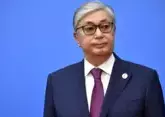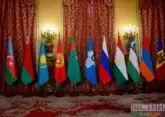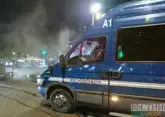The Bulletin of the Atomic Scientists is keeping the Doomsday Clock set at two minutes to midnight — a metaphor for the end of the world — calling the threats against humankind "a new abnormal.'
The scientists announced that the clock is stuck at 11:58, citing nuclear weapons and climate change as two existential risks that leave the world dangerously close to an apocalypse.
"The 2019 time should not be taken as a sign of stability but as a stark warning. It’s a state as worrisome as the most dangerous times of the Cold War," the New Yok Times cited Bulletin President Rachel Bronson as saying.
She said the current time is the closest it has been to doom since 1953, when the United States and Soviet Union began testing hydrogen bombs.
Bronson said the board was mainly concerned that "U.S.-Russian relations are near an all-time low," "the arms-control architecture is deteriorating" and "carbon emissions are rising after a period of plateauing."
More specifically, the scientists referenced the unresolved issues with North Korea and President Trump’s decision to abandon the nuclear deal with Iran.
The clock, a metaphorical measure for humankind’s proximity to destruction, has wavered between two and 17 minutes to the apocalypse since its inception in 1947.
Since then, the Bulletin’s board has determined how far the clock’s minute hand will move, usually to draw attention to worldwide crises that it believes threaten the survival of the human species.
Last year, the clock advanced 30 seconds, to two minutes to "midnight." It had also advanced 30 seconds in 2017 but did not move at all in 2016.
Director of the Institute of Political Studies Sergei Markov, speaking with the correspondent of Vestnik Kavkaza, noted that the world is really close to a global catastrophe now, much closer than earlier. "First, there is a gradual degradation of Western democratic institutions, where a consortium of unelected bureaucrats, special services and oligarchs receive power, while the population loses control of the government. That is why, the U.S. government, for example, stages a coup in Ukraine, directly finances neo-Nazis and supports terrorists in Syria; the United Kingdom, in turn, imitates the use of chemical weapons in the form of the provocative Skripal case. Second, the unipolar world is transforming to something new, global role of the former leader, the United States, is largely reduced, but the American coalition is striving to retain its power, which caused the current attempt to instigate a civil war in Venezuela," he said.
"Third, new types of weapons are developed, first of all, cyber weapons, which makes the transition from provocations to war easier. Relatively speaking, the ISIS terrorist group, banned in Russia, organizes a cyber attack on the UK and the U.S. under the guise of "Russian hackers", which declare that the attack was coming from Russia and strike Russian servers back. Russia, of course, also responds, which causes a cyberwar leading to disastrous consequences. Fourth, there is an inadequate faction in power in the United States, which abandons most of the disarmament treaties. Fifth, the information war tools have become so sophisticated that classical freedom of speech and press freedom have disappeared in Western countries, and all together it increases the possibility of a random start of a global war," Sergey Markov stressed.
The deputy head of the Council of the Russian Diplomats Association, Andrey Baklanov, said that concerns about the prospects of international security are reasonable. "Indeed, the world stands literally two minutes before a possible catastrophe. First of all, I’m worried that there is a certain regression in the process of preventing unauthorized and accidental outbreak of hostilities. This process has begun in 1962, a number of agreements were concluded, mainly of bilateral nature. Now these agreements have stunned. Attempts to agree with the Americans on the resumption of this work were unsystematic and unfinished. Alas, we do not even fully understand how serious the situation is, especially with the acceleration of scientific and technological progress. We need to immediately restart the process to prevent such a development," he urged.
"The second problem is that practically no serious crisis has been adequately addressed by international law at present. On the contrary, crises are falling apart into new ones. The third problem is a sharp increase in danger for Russia. It is necessary to pursue a more stringent policy to prevent such attacks at the earliest stages. The fourth problem is the withdrawal of the U.S. from the systematic agreements on the prevention of the arms race and the new stage of the arms race, with the possibility of further movement of NATO weapons to our borders. All of this suggests that the overall situation is extremely alarming, and we need to take comprehensive measures in all directions in order to reverse the negative trends," Andrei Baklanov concluded.










